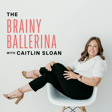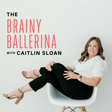
65. Inside the Raising Leaders Program with Kerry Nicholls of San Francisco Ballet
In this inspiring episode of The Brainy Ballerina Podcast, we sit down with Kerry Nicholls, Director of Artist Development at San Francisco Ballet, to explore the groundbreaking Raising Leaders program.
We dive deep into how the Raising Leaders program is transforming professional dancers into empowered leaders both on and off the stage. Kerry shares how dancers are selected, what the two-year curriculum entails, and how the program bridges the gap between performing and planning for a meaningful career after dance.
What You'll Learn in This Episode:
- Kerry’s personal dance journey and transition into leadership
- Why she believes it’s never too early for dancers to think about life after dance
- The mission behind the Raising Leaders program at San Francisco Ballet
- How this initiative supports dancers’ personal growth, professional development, and studio leadership
- The four major differences that set Raising Leaders apart from other dancer career development programs
- How partnerships with Stanford University and LinkedIn are elevating the program
- Actionable advice for dancers at companies with fewer resources to begin planning for their future
- The real-world leadership skills dancers aren’t always taught in the classroom, and how to build them
Whether you're a student, a professional dancer, or a company director, this episode will spark ideas about how to support longevity and leadership in the dance world.
Tune in to discover how dancers can thrive beyond the stage, starting now.
Connect with Kerry Nicholls:
San Francisco Ballet’s Website
Links and Resources:
✨APPLY to The Core Corps: thebrainyballerina.com/thecorecorps
Get your copy of the Intentional Career Handbook
Let’s connect!
My WEBSITE: thebrainyballerina.com
INSTAGRAM: instagram.com/thebrainyballerina
Questions/comments? Email me at caitlin@thebrainyballerina.com
This episode was brought to you by the Pivot Ball Change Network.

